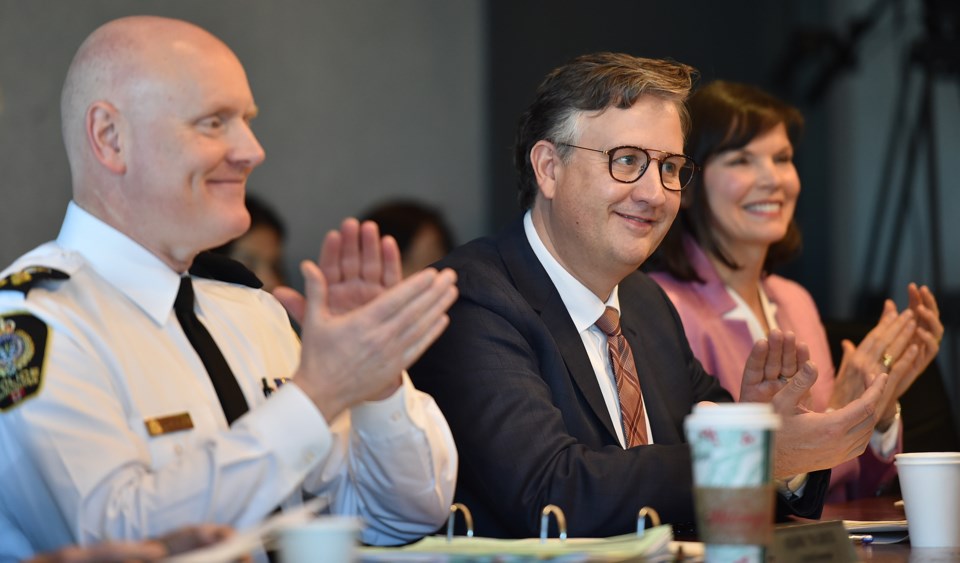Here’s a question for all you Vancouver Police Board enthusiasts: Do you think Mayor Kennedy Stewart should be the chairperson of the board?
Before you answer that, I should tell you I asked Stewart the same question after he was sworn in Dec. 6 as chairperson. His appointment, by the way, is written into the Police Act and is a role he inherits as mayor.
In fact, all mayors of municipalities with municipal police departments—Delta and New Westminster, to name a few—become defacto chairpersons of their respective police boards.
I’ll get to Stewart’s answer after I explain a few things.
First, my question is in no way a suggestion that Stewart can’t handle the job. I posed the same question to then-mayor Sam Sullivan in 2008 in his final days as mayor and chairperson of the board.
I asked the question because a few weeks before Sullivan finished his term, the board at the time made it clear that it wanted the provincial government to consider revising the Police Act to prevent the mayor from becoming the chairperson.
Why?
It had nothing to do with the performance of Sullivan or previous mayors. It had everything to do with what the board described as “an inherent conflict” of the position of mayor. That conflict was having a politician on a board whose job also involves approving (or cutting) budgets for the police department.
Sullivan in 2008: “There is a definite conflict that happens with the mayor trying to represent the broader budget and also representing the police. Certainly, I feel the tensions regularly.”
Gregor Robertson in 2010 when he was mayor and chairperson of the board: “It makes more sense to separate [the roles]. I agree with all of those who have called for this to change because I don’t think it’s best practices to have dual roles. It doesn’t make my work, in either job, any easier to have overlap.”
The board never did get anywhere with its request to the provincial government, but I've forgotten exactly why. I believe it was something to do with the arrangement working fine, that Vancouver was the only board to complain, so no need to change it.
The issue of a mayor pulling double duty as chairperson of the board also made its way into the Stanley Cup Riot review that was released in August 2011.
Quite a bit was written over three pages in the report titled, The Night the City Became a Stadium.
Here's one quote to give you some insight:
"The mayor's responsibilities could be better exercised if he or she was dealing with the police board and not directly with the chief as chair of the police board. We asked the mayor [Robertson] to comment directly on the perception of conflict in this role. To his credit, he said that the requirement to be chair of the police board is not good governance. This is significant, albeit the police chief constable [Jim Chu} and a former chief thought the arrangement worked well in practice. However, what the public thinks is, we feel, paramount."
Coincidentally, the same day Stewart was sworn in as chairperson was the day the Vancouver Police Department’s budget was presented to the board—all $294,366,398 million of it, which is an increase of 3.5 per cent or $9.9 million.
The board unanimously approved the budget.
It will now go before city council Dec. 11 for review and be voted on Dec. 18. The mayor, of course, will be in the council chamber to cast his vote on an overall budget that city staff recommends should come with a 4.9 per cent property tax increase. Some of that increase is connected to salary and benefit increases to police officers and firefighters.
So does Stewart feel conflicted or awkward about his role as chairperson?
Before I provide his answer, I want to make it clear he doesn’t vote at the police board unless he has to break a tie, which rarely happens. But at council, he does vote, although as an independent mayor he can’t count on the majority vote that Robertson could under the previous Vision Vancouver administration.
“There would be more concern if there was a strong mayor system like you have in London where the mayor approves the entire budget,” Stewart said. “But this budget is approved by 11 votes on council, and so I don’t feel there’s a problem there for me. It’s not like it’s solely my decision.”
The board, by the way, is not elected. Stewart is the only politician of the nine members, with the majority appointed by the provincial government and one from the city. The board plays an important role in Vancouver, overseeing the police budget and setting policy for the police department.
It is also responsible for hiring the police chief, who was careful in his response to the question I posed to begin this piece.
“Previously, under mayor Gregor Robertson, we had a good relationship, we worked through issues at the board level and on a personal level , and so far everything has been great with the new mayor,” said Adam Palmer, whose contract extension earlier this year will see him work with Stewart over his full four-year term. “If you look at the history of the department—and I can’t speak for all the departments in the province—but in Vancouver, it’s actually worked very well. We haven’t had issues with it, other than the academic debate.”
Interestingly, Palmer is a member of the Transit Police Board, whose chairperson is not a politician. It’s Mark Reder, who leads Fleishman-Hillard’s public affairs team in Vancouver. The provincial government appointed Reder, Palmer and five other members.
The city, meanwhile, will soon appoint another person to the police board to replace Carolyn Askew, who has come to the end of her term. Askew was a former chairperson of Vision Vancouver, which no longer has any representation on city council.
@Howellings



